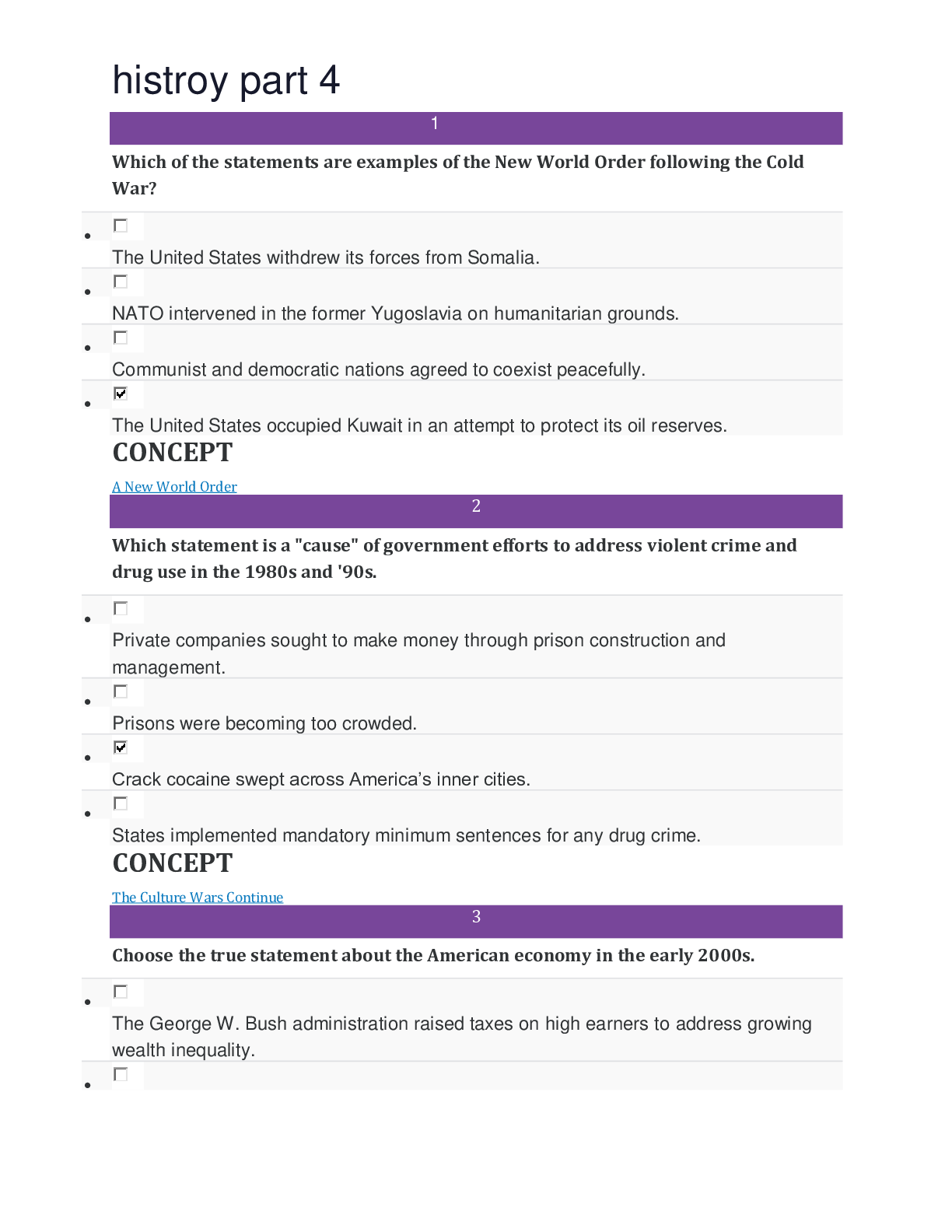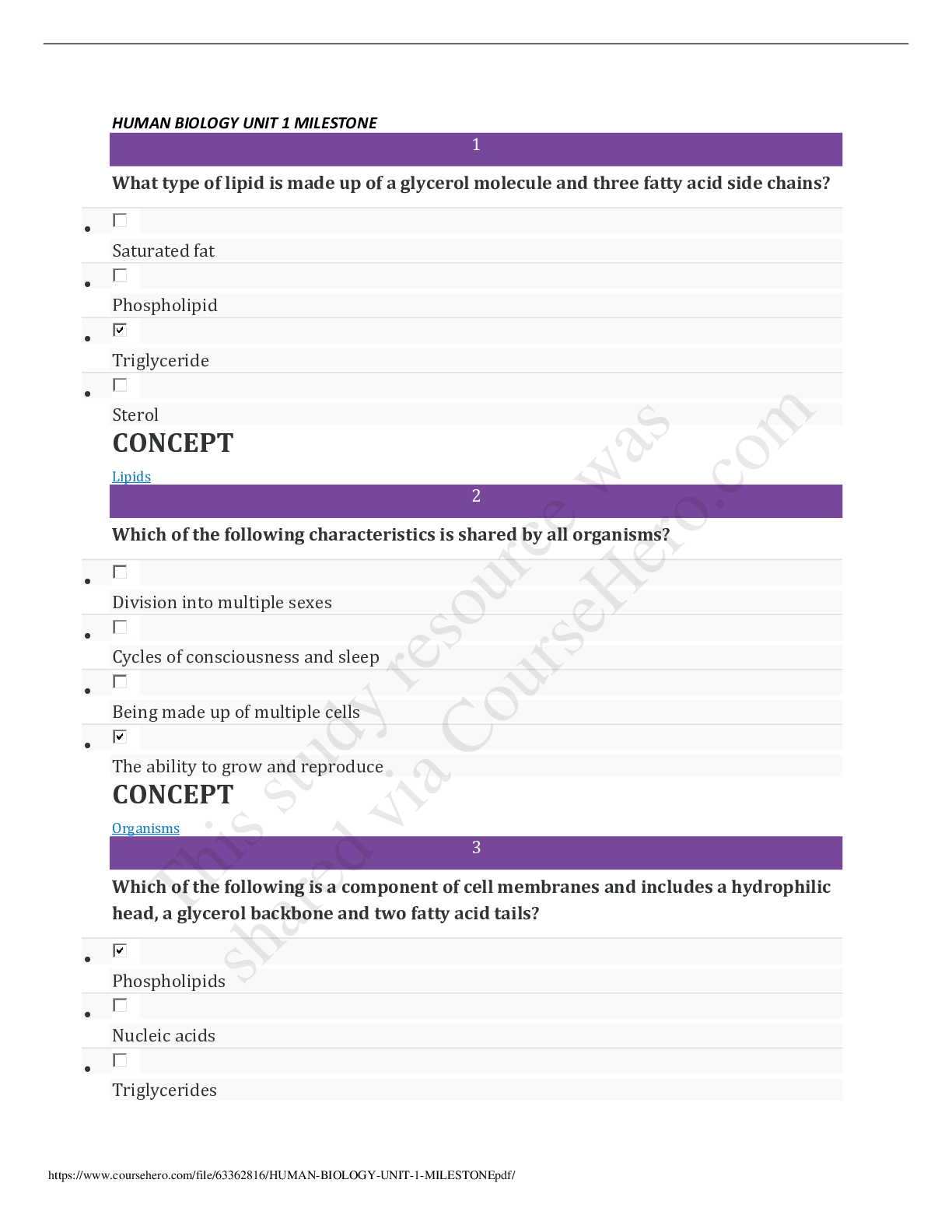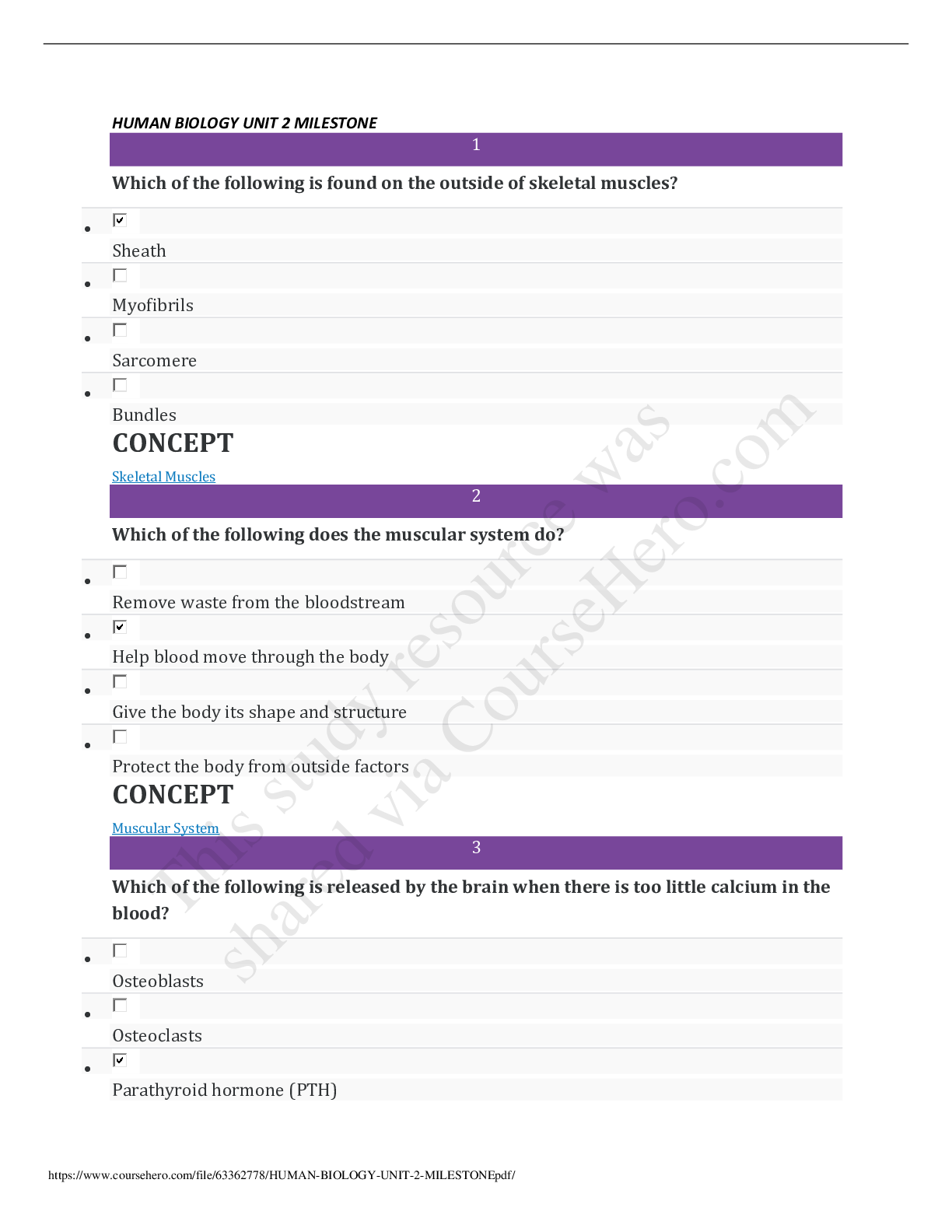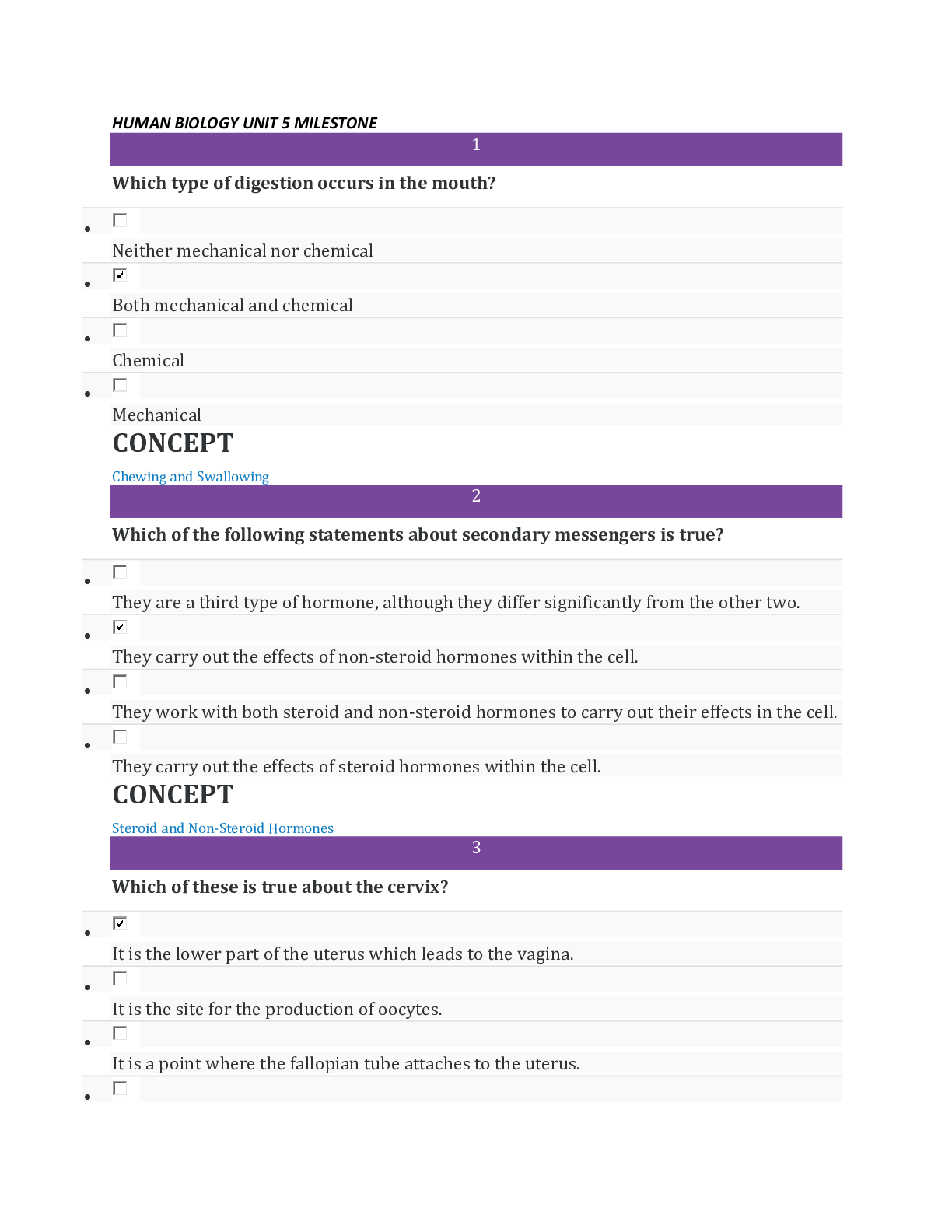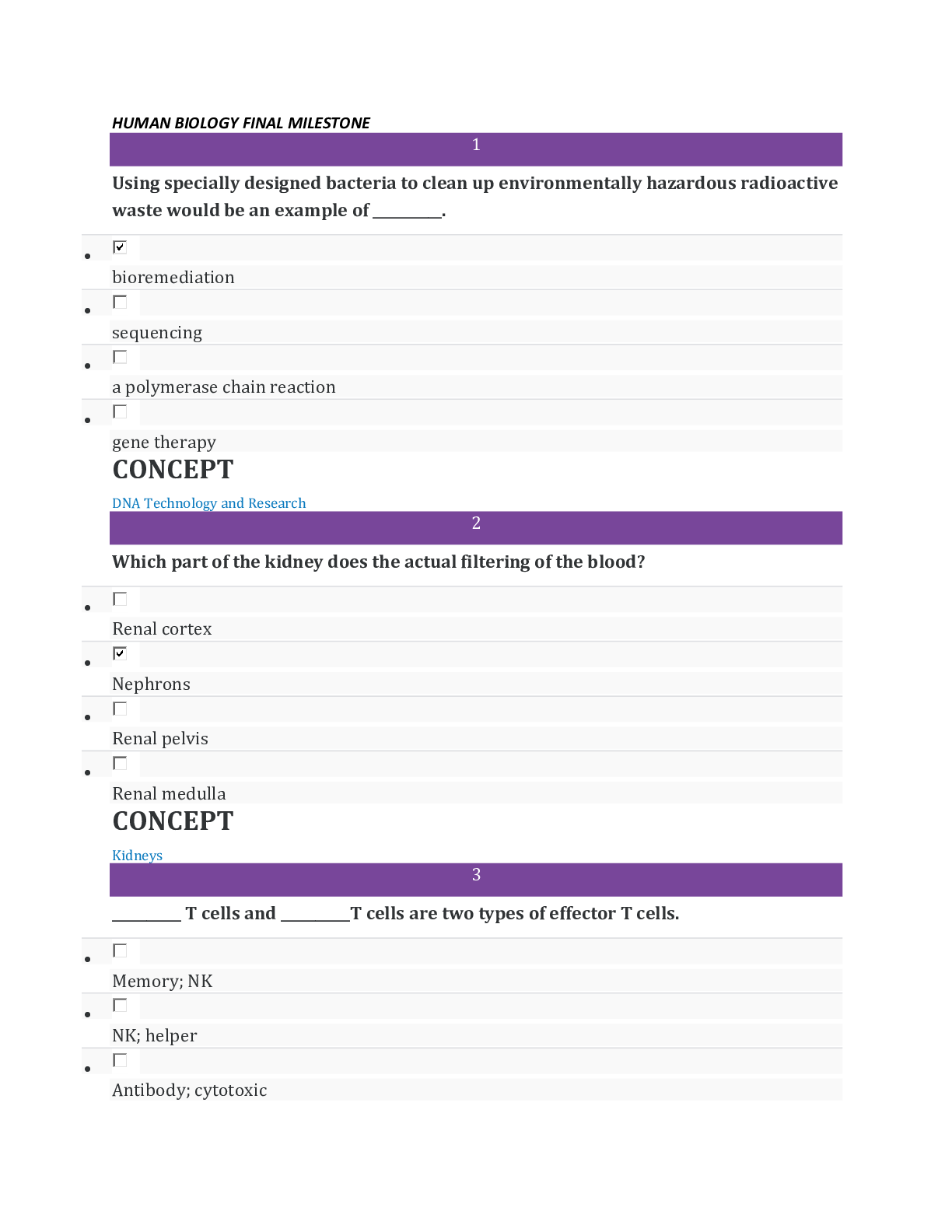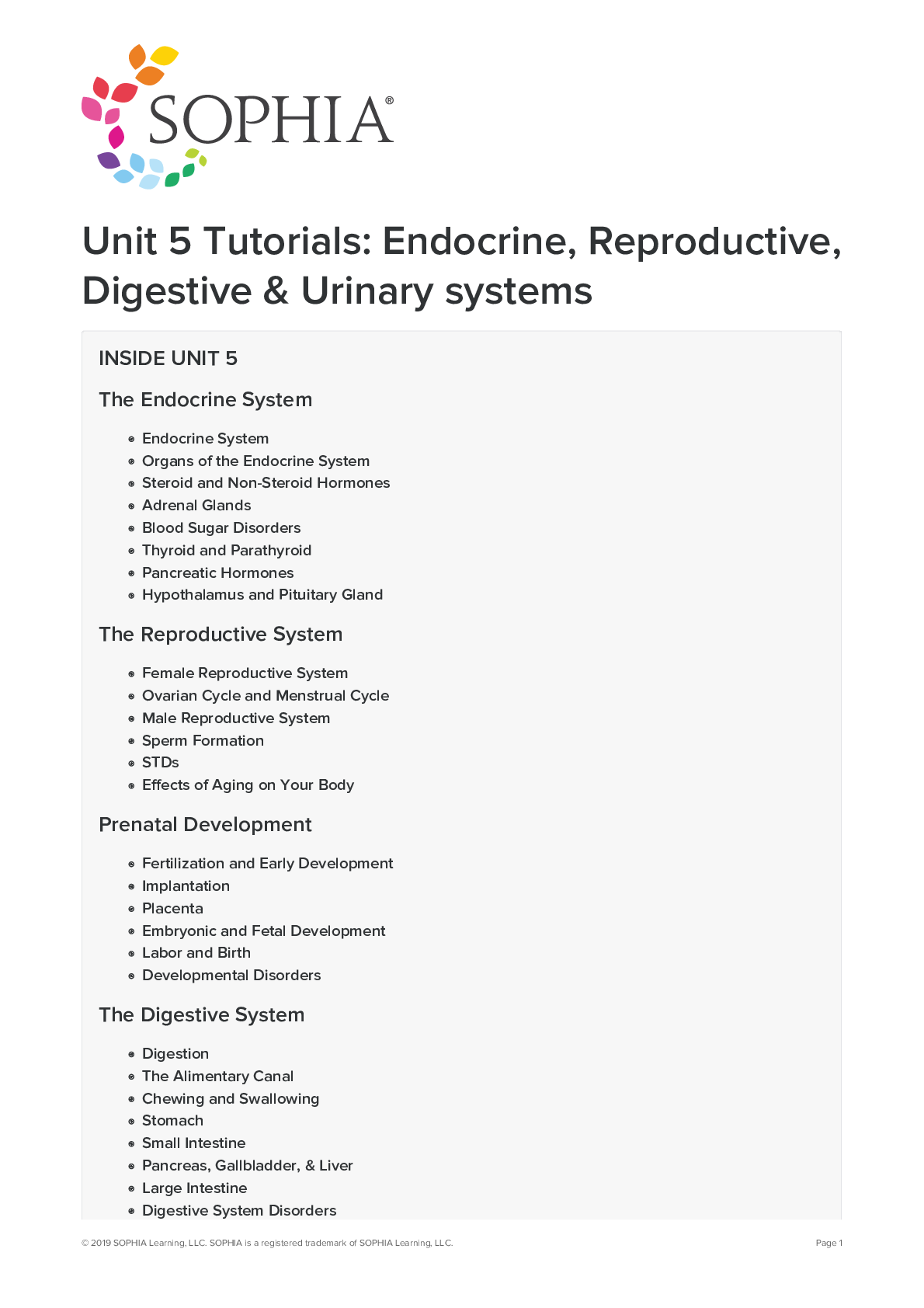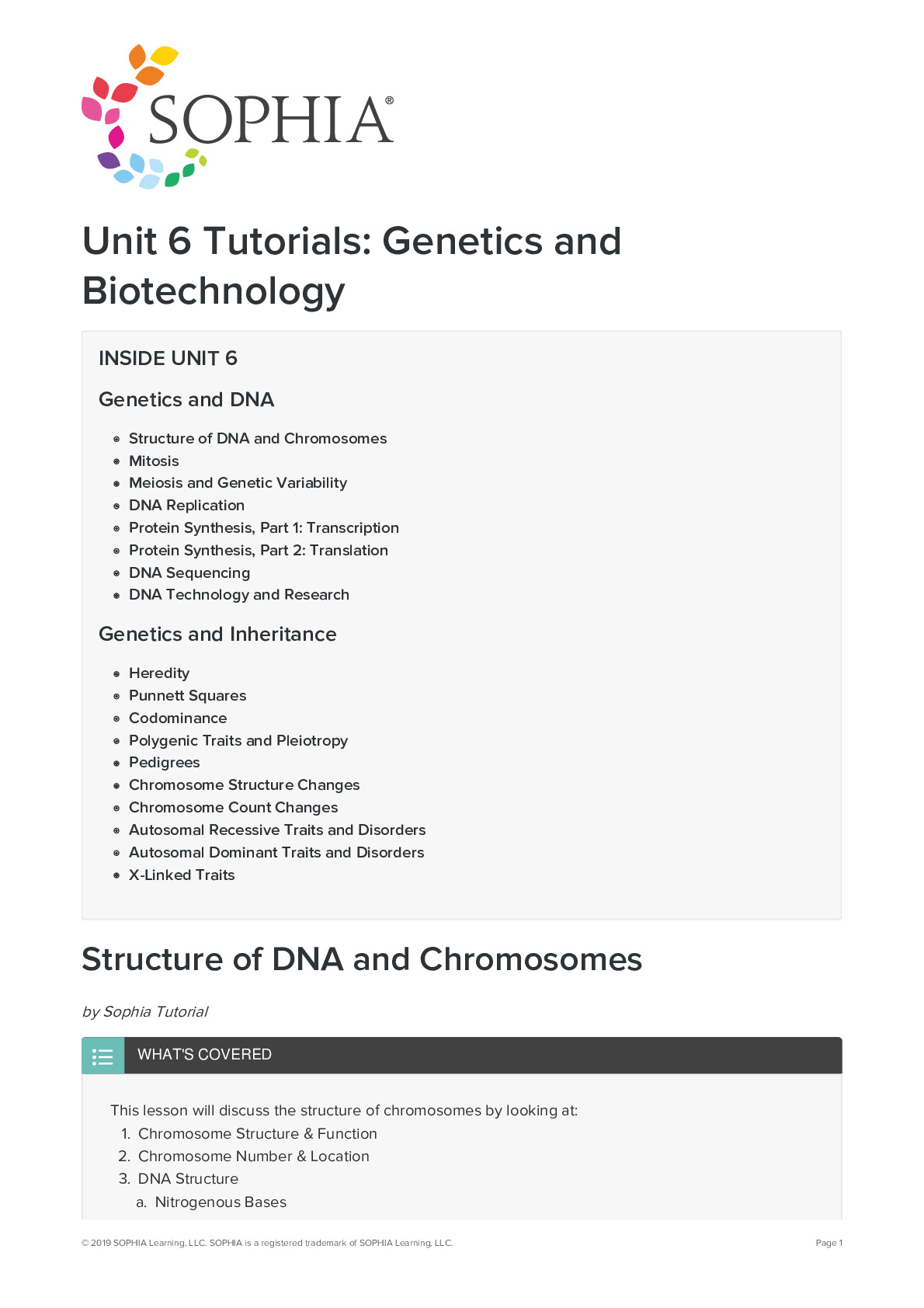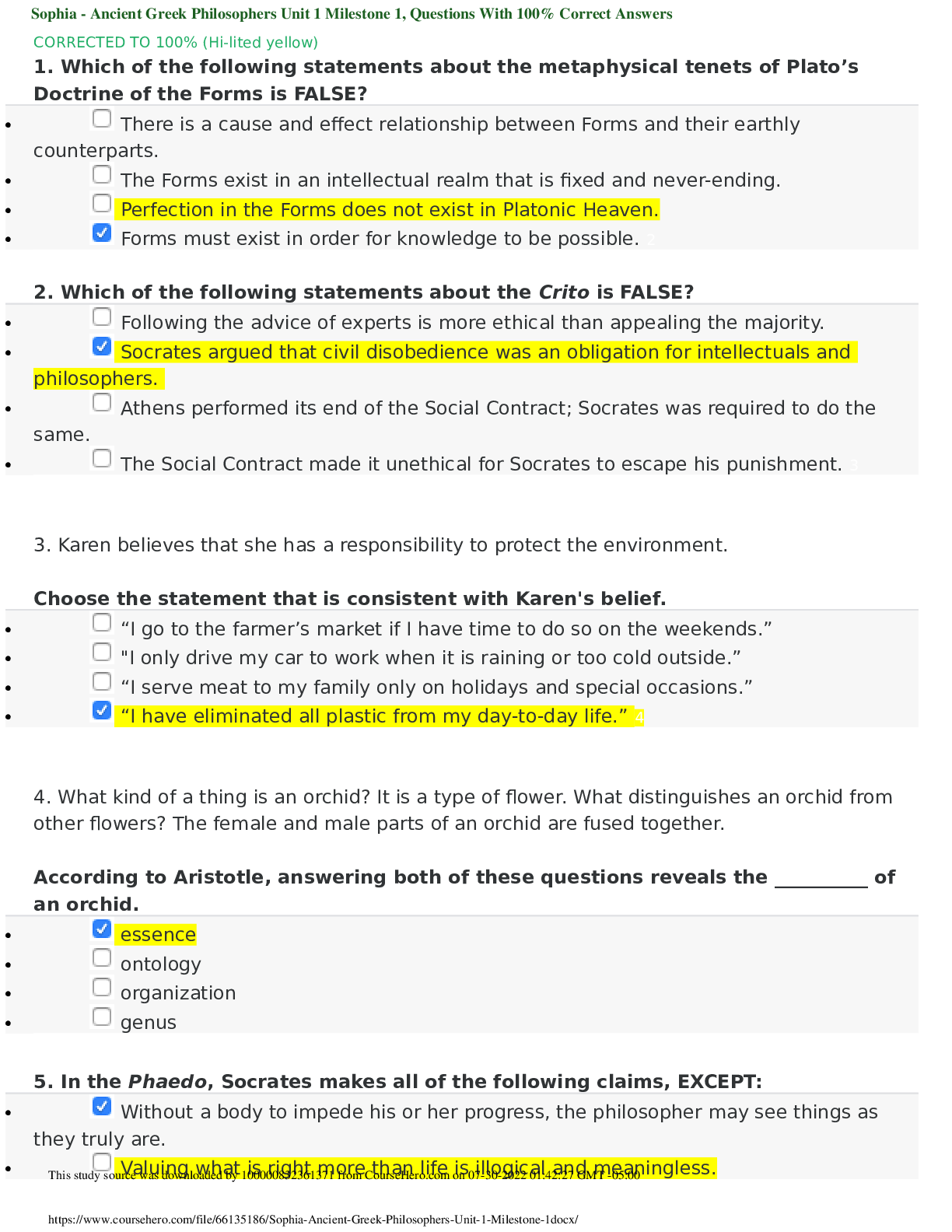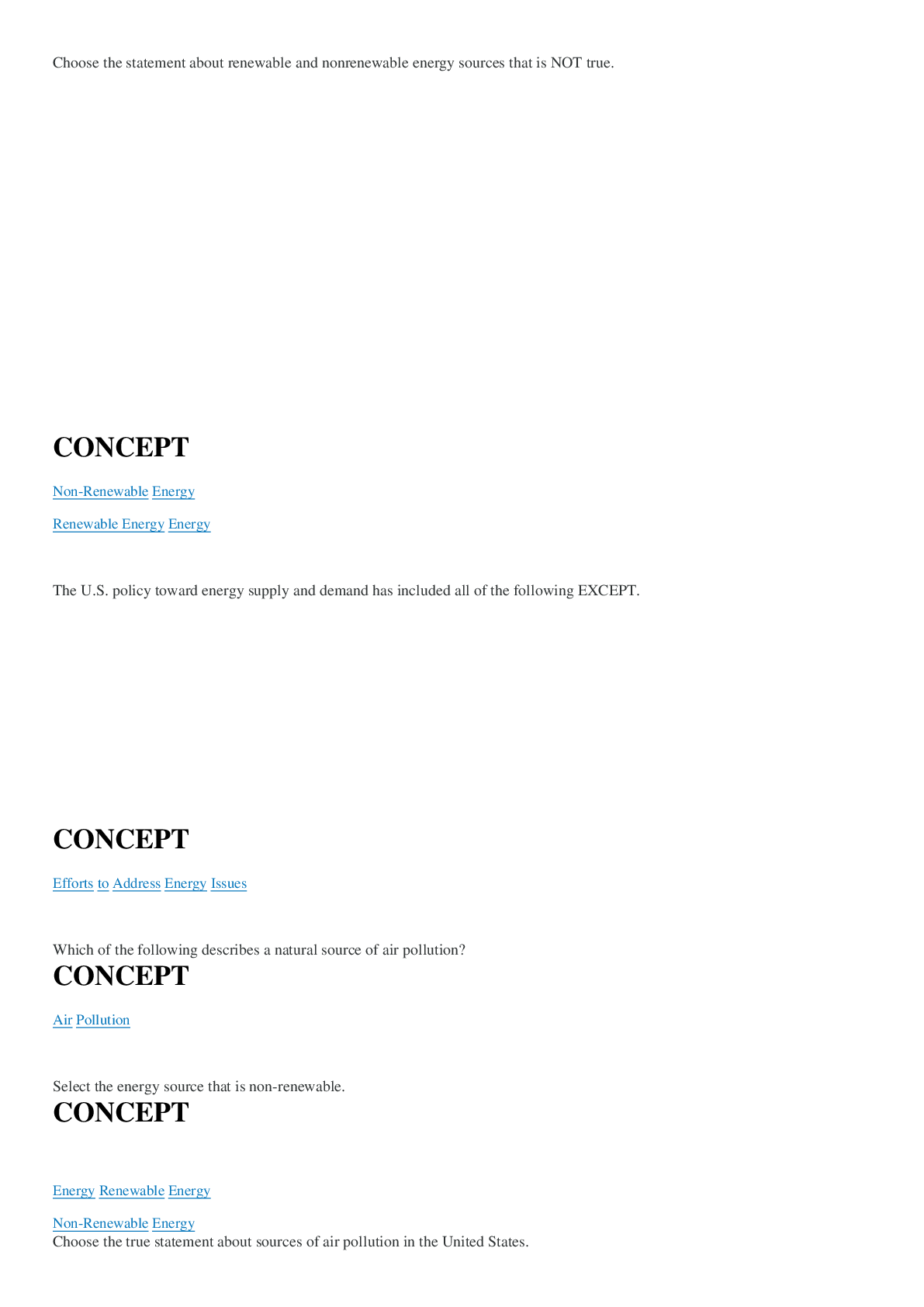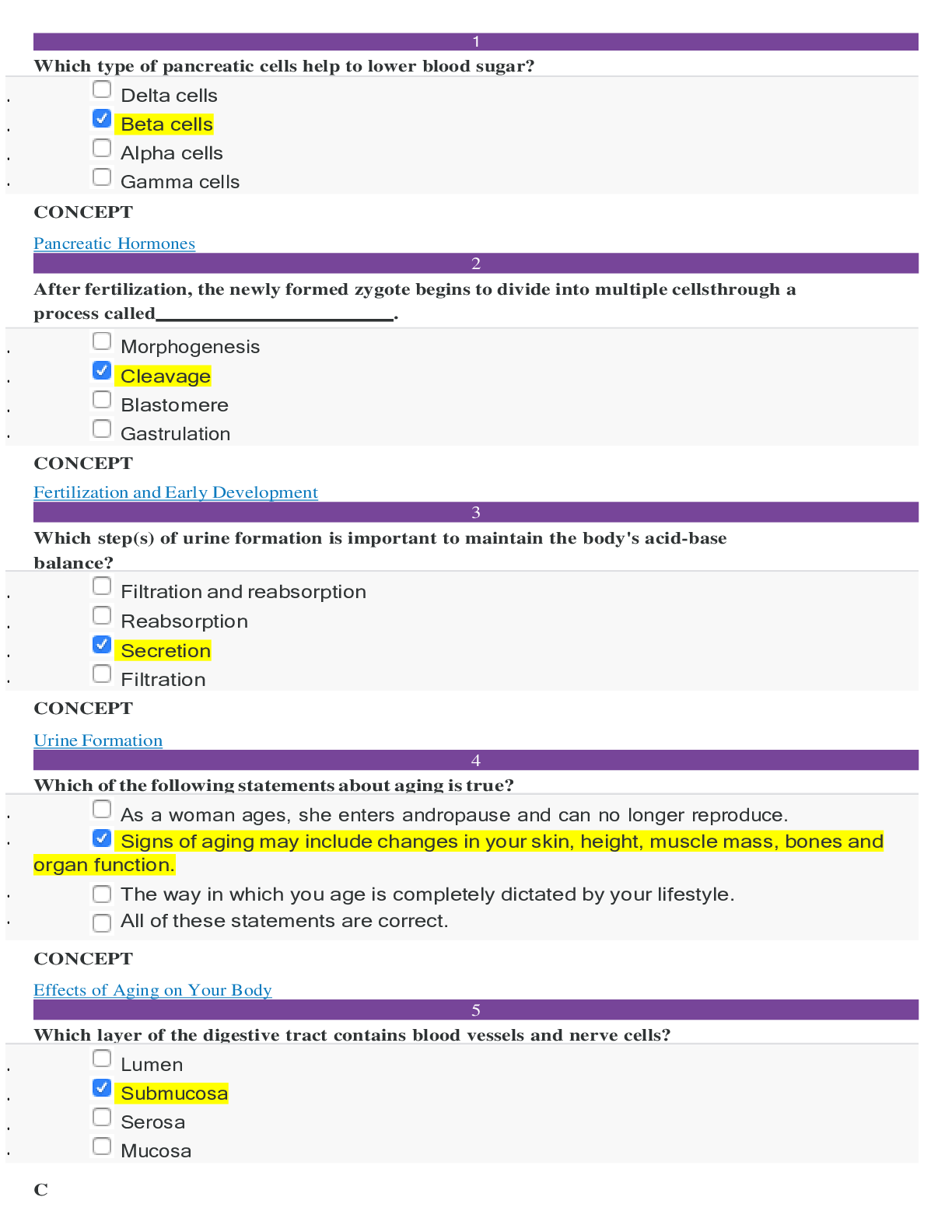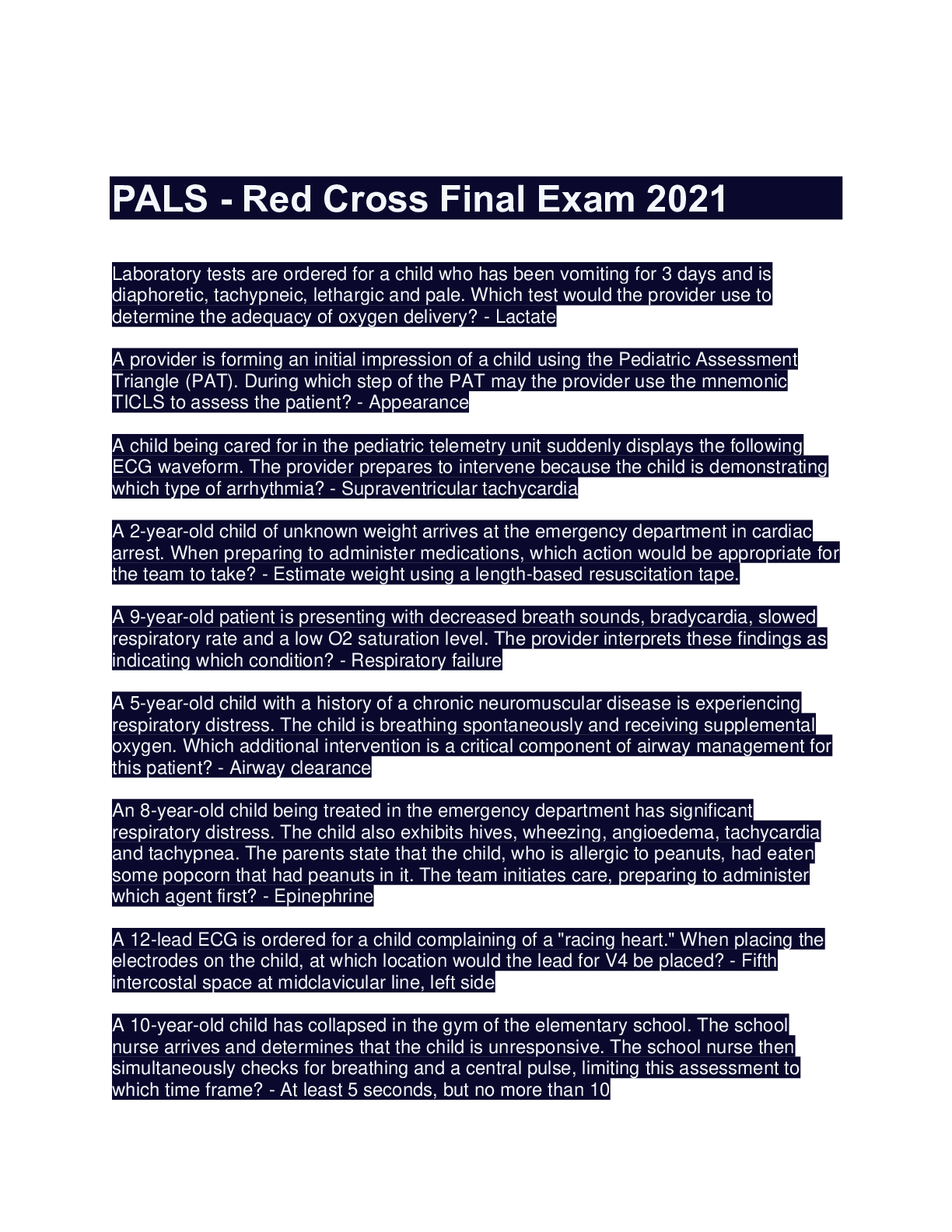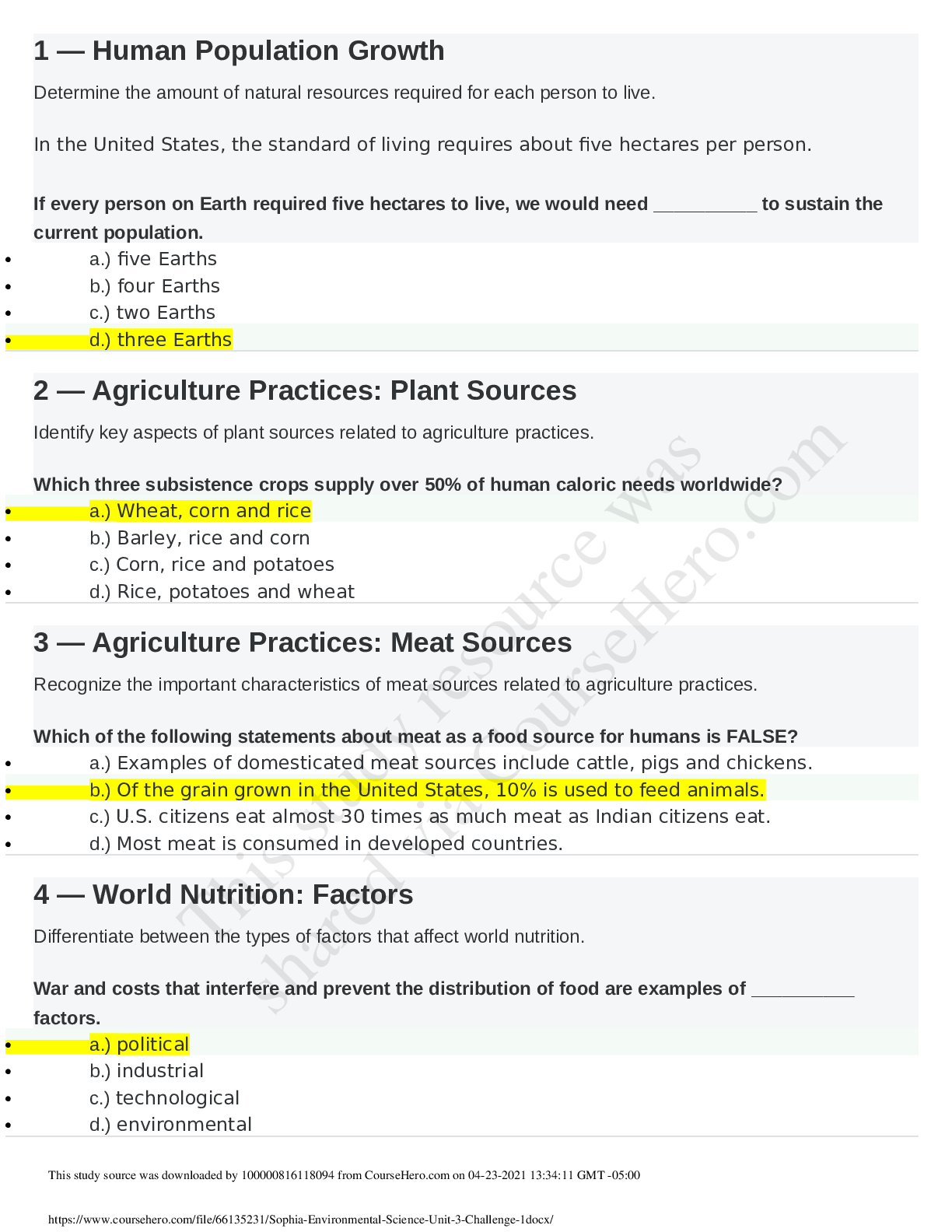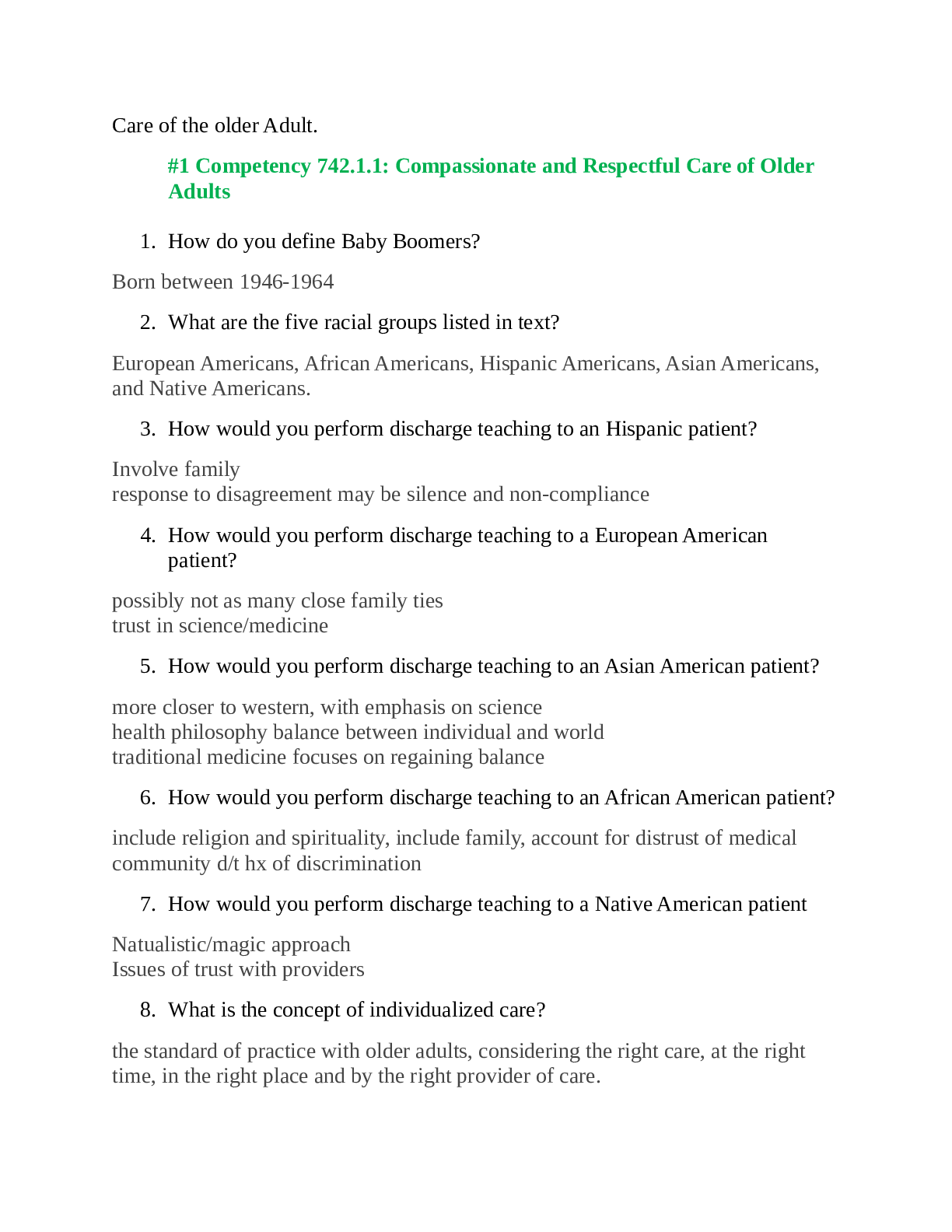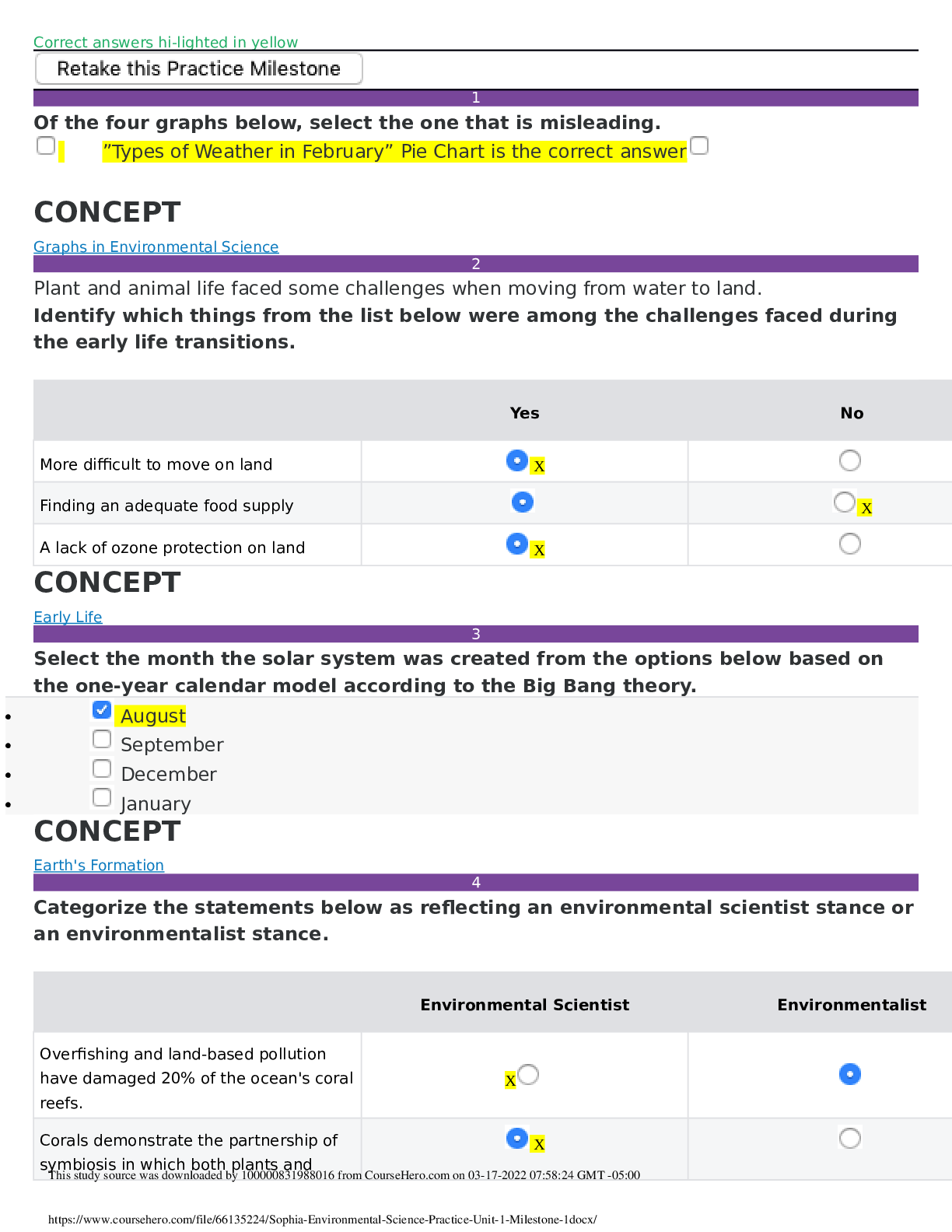Philosophy > SOPHIA PATHWAY > Ancient_Greek_Philosophers_Final Exam 2020 - Southern new Hampshire University | Ancient_Greek_Philo (All)
Ancient_Greek_Philosophers_Final Exam 2020 - Southern new Hampshire University | Ancient_Greek_Philosophers_Final Exam 2020
Document Content and Description Below
Ancient_Greek_Philosophers_Final Exam 2020 - Southern new Hampshire University | Ancient_Greek_Philosophers_Final Exam 2020 7/8/2020 Sophia :: Welcome https://snhu.sophia.org/spcc/ancient-greek-ph... ilosophers/milestone_take_feedbacks/4597512 1/16 UNIT 1 — MILESTONE 1 Score 22/25 You passed this Milestone 22 questions were answered correctly. 3 questions were answered incorrectly. 1 Which of the following statements about the atomistic worldview is FALSE? All reality is composed of atoms in a void. Atoms come in different shapes and sizes, and can exist in a number of ways. A philosophical atom is the same as a chemical atom. Everything that exists is either an atom or a collection of atoms. RATIONALE The atomists believed that everything that exists is either an atom, or a collection of atoms. They also believed that all matter and phenomena are the result of different configurations of atoms of different shapes and sizes. However, a philosophical atom is not the same as a chemical atom. To the atomists, a philosophical atom was an indivisible entity. Chemical atoms, as science has demonstrated, can be divided into smaller parts. CONCEPT The Atomistic Worldview 2 Recall the similarities and differences between Plato and Aristotle's philosophical approaches.7/8/2020 Sophia :: Welcome https://snhu.sophia.org/spcc/ancient-greek-philosophers/milestone_take_feedbacks/4597512 2/16 Select the statement that would most likely have been made by Plato, rather than by Aristotle. “My ideas have served as a starting point for both philosophy and the physical sciences.” “I teach by example and I live by what I teach, no matter the consequences.” “My approach is scientific and empirical; we learn about truth from observation and discovery.” “In order to find truth, we must first identify what makes a thing what it is, its essence. RATIONALE Plato proposed the existence of essences in his doctrine of the Forms. As a result, it is more likely that he would have made this statement. As a rationalist philosopher, Plato believed that knowledge does not rely on human senses alone, and can be accessed through the existence of essences. The statements which involve science and empiricism are reflective of Aristotle's views. The statement about teaching and living by example is reflective of Socrates' philosophy. CONCEPT Aristotle: The Dissection of Reality 3 According to Socrates in the Phaedo, why might death be an advantage to the philosopher? In life, the Social Contract requires people to behave according to the needs and wants of others. Death is the ultimate distinction between knowledge and opinion. Only humans can seek knowledge and truth, but their ability to do so ends with death. Eyes, ears, and other bodily organs can distract one from the attainment of truth and knowledge. RATIONALE The Phaedo is a conversation between Socrates and his students about death. It takes place just before his execution. During this conversation, Socrates explains why philosophers should not fear death, which he defines7/8/2020 Sophia :: Welcome https://snhu.sophia.org/spcc/ancient-greek-philosophers/milestone_take_feedbacks/4597512 3/16 as the end of the life of the body, but not of the soul. Socrates views the body as an impediment to the acquisition of wisdom and truth. Therefore, a philosopher may be able to find answers after death that cannot be found during life. CONCEPT The Phaedo: The Death of Socrates 4 “As a physicist, I see all elements as either connected by love or separated by conflict.” Which ancient philosopher would most likely have made this statement? Empedocles Anaxagoras Xenophanes Pythagoras RATIONALE Empedocles was a Pre-Socratic philosopher and physicist who believed that everything in the cosmos was made up of six metaphysical entities. He believed that, rather than beginning and ending, everything in the universe resulted from the continuous mixing and separation of these entities. Although Empedocles's ideas were informed by the Pythagorean doctrine of reincarnation, Pythagoras is not the correct answer because he was not a physicist. CONCEPT Cosmology and the First Philosophers 5 For Plato, the Forms are the __________ foundation of reality, which means that knowledge of reality is grounded in knowledge of the Forms. ethical natural7/8/2020 Sophia :: Welcome https://snhu.sophia.org/spcc/ancient-greek-philosophers/milestone_take_feedbacks/4597512 4/16 metaphysical logical RATIONALE Plato was interested in abstract concepts (e.g., being and substance). These concepts are the subjects of the field of philosophy known as metaphysics. Plato wanted to know how these concepts exist in reality (i.e., their essences). Therefore, Plato's Forms were his metaphysical notion of the essences that ground the knowledge of reality. CONCEPT Plato's Forms: The Objects of Knowledge 6 Which branch of philosophy examines the ultimate nature of reality? Natural philosophy Cosmology Metaphysics Epistemology RATIONALE Metaphysics is the branch of philosophy that is concerned with discovering and describing the ultimate nature of reality. Cosmology is the study of the universe in its totality, natural philosophy examines nature and the universe, and epistemology analyzes and defends concepts of knowledge. CONCEPT What is Philosophy? 7 What kind of a thing is an orchid? It is a type of flower. What distinguishes an orchid from other flowers? The female and male parts of an orchid are fused together.7/8/2020 Sophia :: Welcome https://snhu.sophia.org/spcc/ancient-greek-philosophers/milestone_take_feedbacks/4597512 5/16 According to Aristotle, answering both of these questions reveals the __________ of an orchid. genus organization essence ontology RATIONALE According to Aristotle, we can discover and describe essences by identifying a genus and a differentia. The genus (in this example, a flower) tells us what kind of thing an orchid is. The differentia tells us what sets an orchid apart from other things of the same kind. CONCEPT Aristotle on What There Is 8 Roland is a compassionate person. He sometimes gives money that he needs for himself to strangers who beg on the street. According to Aristotle’s ethics, Roland should do which of the following in order to cultivate the virtue of compassion? Find middle ground between being too compassionate and not compassionate enough. Stop giving away his money so that he can focus on taking care of himself. Find other ways to help people besides giving his money away. Spend time with compassionate people in order to learn the essence of compassion. RATIONALE7/8/2020 Sophia :: Welcome https://snhu.sophia.org/spcc/ancient-greek-philosophers/milestone_take_feedbacks/4597512 6/16 Aristotle's Doctrine of the Mean states that virtue must be cultivated as a rational mean between extremes. Therefore, Roland should find middle ground between being too compassionate and not compassionate enough in order to cultivate the virtue of compassion. CONCEPT Aristotle's Highest Good 9 Select the statement upon which Plato and Aristotle would disagree. Truth is important above all else. Essences exist independently of the world. Reasoning and logic are key to finding truth. Essences exist and are genuine entities. RATIONALE Plato and Aristotle agree on all of these points except for the statement that essences exist independently of the world. This was Plato's belief, but Aristotle believed that essences exist only within worldly objects, and nowhere else. CONCEPT Plato vs. Aristotle: The Mathematician or the Biologist 10 Heraclitus developed __________, which maintained that the world is composed of objects and their counterparts, all of which are connected to one another. the Unity of Opposites the Doctrine of Flux Heraclitean metaphysics7/8/2020 Sophia :: Welcome https://snhu.sophia.org/spcc/ancient-greek-philosophers/milestone_take_feedbacks/4597512 7/16 Heraclitean paradoxes RATIONALE Heraclitus developed the principle called the Unity of Opposites. It maintains that the world is composed of opposites, and that opposites are linked in a system of connections. This principle is one part of Heraclitean metaphysics. CONCEPT Heraclitus and the Doctrine of Impermanence 11 Choose the statement that describes a central theme of Parmenidean metaphysics. The universe consists of one, unchanging entity. The opinions of mortals are universally reliable. Mortal and divine knowledge can be joined. The world is composed of linked opposites. RATIONALE Parmenidean metaphysics includes the concept of "substance monism" — the belief that all reality is one object. This object is called the “what-is.” The "what-is" is eternal and unchanging. None of the other statements represent Parmenidean metaphysics. CONCEPT Parmenides and the Doctrine of Permanence 12 Read the following statement by Socrates: “And he attains to the purest knowledge of them who goes to each with the mind alone, not introducing or intruding in the act of thought sight or any other sense together with reason, but with the very light of the mind in her own clearness searches into the very truth of each; he who has got rid, as far as he can, of eyes and ears and, so to speak, of the whole body, these being in his opinion distracting elements which when they infect the soul hinder her from acquiring truth and knowledge . . .”7/8/2020 Sophia :: Welcome https://snhu.sophia.org/spcc/ancient-greek-philosophers/milestone_take_feedbacks/4597512 8/16 Outline Socrates' argument in this text and choose the sentence that accurately reflects it. Life has no intrinsic value; only a good life, well-lived, has value for the gods. The physical body and the soul are both necessary in order to find truth. Death prevents the philosopher from finding the answers he most wants to know. It is the mind, not the senses, that can know the essence of a thing. RATIONALE In this selection from the Phaedo, Socrates argues that the philosopher is not concerned with the world of the senses, but with the soul. When Socrates says "And he attains to the purest knowledge of them who goes to each with the mind alone," he asserts that pure knowledge is readily acquired by the mind when it is separated from the body. The senses (e.g., eyes and ears) are a distraction that "hinder her from acquiring truth and knowledge . . .” Therefore, death (which Socrates views as the end of the life of the body, not of the soul) enables the philosopher to find the answers he or she seeks. CONCEPT The Apology — Socrates' Arguments 13 All of the following are central tenets of Aristotle’s ethics, EXCEPT: Knowing the essence of a thing can justify a belief. Any virtue can become a vice. An action is evaluated based on how it informs character. Something is good when it excels at its function. RATIONALE7/8/2020 Sophia :: Welcome https://snhu.sophia.org/spcc/ancient-greek-philosophers/milestone_take_feedbacks/4597512 9/16 Aristotelian ethics are concerned with topics which include determining what makes actions good or bad, and how to define virtue. According to Aristotelian ethics, it is important to know the essence of a thing, not because it can justify a belief, but because it determines function which, in turn, determines virtue or excellence. CONCEPT Aristotle's Highest Good 14 Which of the following statements about the Crito is FALSE? Athens performed its end of the Social Contract; Socrates was required to do the same. Following the advice of experts is more ethical than appealing the majority. Socrates argued that civil disobedience was an obligation for intellectuals and philosophers. The Social Contract made it unethical for Socrates to escape his punishment. RATIONALE In the Crito, Socrates argues against the concept of civil disobedience. In an imagined dialogue between him and Athens, Socrates says "But he who has experience of the manner in which we order justice and administer the state, and still remains, has entered into an implied contract that he will do as we command him." In other words, a person who has benefited from the protection and privileges provided by a state, and who has not sought to change its laws or leave its jurisdiction, must accept its judgement. This is an early expression of the concept of the Social Contract. CONCEPT The Crito: The Duties of the Social Contract 15 Which of the following statements about the metaphysical tenets of Plato’s Doctrine of the Forms is FALSE? There is no knowledge because everything is in a state of transition and nothing is true. Plato’s Doctrine of the Forms grounds knowledge and being.7/8/2020 Sophia :: Welcome https://snhu.sophia.org/spcc/ancient-greek-philosophers/milestone_take_feedbacks/4597512 10/16 The intellectual realm in which the Forms exist is unchanging and eternal. Worldly objects imitate the more real, genuine Forms of objects. RATIONALE The statement that "There is no knowledge because everything is in a state of transition and nothing is true" is the opposite of Plato's metaphysical beliefs. His Doctrine of the Forms argues that all worldly objects are related to their essences (i.e., Forms), which are real, unchanging, perfect entities that exist in an intellectual realm called Platonic Heaven. The Forms provide the basis for all knowledge. CONCEPT Plato Forms: The Foundations of Being 16 Being a good parent is a __________ condition for having a child. Apply conceptual analysis to this statement and choose the answer that correctly describes the relationship. necessary, not sufficient neither necessary nor sufficient both necessary and sufficient sufficient, not necessary RATIONALE Being a good parent is not a necessary condition, or logical requirement, for having a child because there are people who have children who aren't good parents. In order to be a parent, a person must have a child. That makes being a good parent a sufficient, but not a necessary condition for having a child. CONCEPT Plato: An academic approach to concepts 17 While I have lived in my home, my rent has increased every year.7/8/2020 Sophia :: Welcome https://snhu.sophia.org/spcc/ancient-greek-philosophers/milestone_take_feedbacks/4597512 11/16 My salary has remained the same for three years. Next year, I will probably be in a better financial situation. Evaluate the argument and select the option that describes it. Inductive, weak, uncogent Deductive, invalid, unsound Deductive, valid, sound Inductive, strong, cogent RATIONALE Because the inferential claim is of less-than-logical certainty, and is about probability, this is an inductive argument. It is a weak argument because the conclusion isn't probable if the premises are true. It is also an uncogent argument because an argument must be strong to be cogent. CONCEPT Evaluating an Argument in Action 18 Fred believes that the death penalty is ethically wrong. After watching a documentary about capital punishment, he discussed his belief with his wife. Choose the statement from Fred that is NOT consistent with his belief. “Humans must not play God by deciding when someone’s life should end.” “No matter the offense, the state should never use death as punishment.” “If someone harmed a member of our family, I believe he would deserve death.” “The threat of the death penalty does not deter criminals from committing crimes.”7/8/2020 Sophia :: Welcome https://snhu.sophia.org/spcc/ancient-greek-philosophers/milestone_take_feedbacks/4597512 12/16 RATIONALE To live philosophically, a person must examine his or her beliefs to ground them in knowledge, and then act according to those beliefs. By making an exception to his position on the death penalty for people who harmed a member of his family, Fred displays an inconsistent philosophical worldview. CONCEPT Philosophical Analysis as a Way of Life 19 When Alan joins the military, he discovers that the philosophy of Stoicism is popular with his fellow soldiers. All of the following describe reasons why Stoicism is a good fit for the military, EXCEPT: Courage in battle is measured by the efficiency of one's actions. Soldiers must remain impassive to what is outside their control. Stoicism emphasizes personal control of emotions and actions. It is important for soldiers to do their jobs with skill and dispassion. RATIONALE All of these statements indicate why Stoicism is a good fit for the military except for the suggestion that it improves courage in battle because it makes soldiers more efficient. Stoicism can make soldiers less fearful of outcomes beyond their control, thus enhancing their courage. However, the principles of Stoicism do not create a relationship between courage and efficiency. CONCEPT Stoicism: The Ethics of Dispassion 20 In the Apology, Socrates states that a good person does what he knows to be right despite __________. the wisdom of the gods negative personal consequences7/8/2020 Sophia :: Welcome https://snhu.sophia.org/spcc/ancient-greek-philosophers/milestone_take_feedbacks/4597512 13/16 risking fame and fortune the laws of man RATIONALE The Apology is Plato's transcription of the defense Socrates presented at his trial on charges of "denying the gods" and "corrupting the youth of Athens." In it, Socrates asserts that he does not fear death, because he has lived as he believed was right. To Socrates, it is more important to live rightly than to avoid death and other negative personal consequences. CONCEPT The Apology: A Defense of Philosophy 21 The philosophical value of the Socratic Method is described in all of the following statements, EXCEPT: Students learn from interacting with each other, and the teacher facilitates this process. The emphasis is on finding truth, not on “winning” an argument. Students answer questions to which they know the answers, and are led by the teacher to new truths. The Socratic Method guides students to understanding rather than requiring them to memorize facts. RATIONALE The Socratic Method does not facilitate learning through students' interaction with one another. Rather, it is an exchange between student and teacher, in which the teacher uses the student's knowledge to guide him or her to truth. CONCEPT The Socratic Approach 22 Which of the following is the most important tenet of Stoicism?7/8/2020 Sophia :: Welcome https://snhu.sophia.org/spcc/ancient-greek-philosophers/milestone_take_feedbacks/4597512 14/16 To resist playing a role To feed our desires To understand that reality is either good or bad To let go of what we cannot control RATIONALE Stoicism is a philosophy that encourages us to focus only on what we can control (e.g., our desires, emotions, judgments, and reactions). We should not be upset by things that are beyond our control. Stoicism encourages us to reduce desire and to view reality as neither good nor bad. CONCEPT Stoicism: The Ethics of Dispassion 23 Socrates differed from the pre-Socratics in that his interests were primarily in __________. cosmology and natural philosophy ethics and epistemology the true nature of reality how the universe works RATIONALE The focus of Socrates' philosophy was different from that of the Pre-Socratic philosophers. He investigated questions involving ethics and epistemology. The Pre-Socratic philosophers had focused on natural philosophy and cosmology. CONCEPT Socrates: The Father of Western Philosophy7/8/2020 Sophia :: Welcome https://snhu.sophia.org/spcc/ancient-greek-philosophers/milestone_take_feedbacks/4597512 15/16 24 Which of the following statements about Aristotle's metaphysics is FALSE? The first philosophy for Aristotle was ontology, which examines the nature of being. Aristotle's ultimate conclusion was that the nature of reality was change. For Aristotle, existence requires matter and form— not one or the other, but both. Aristotle defined a particular as “a this” to distinguish it from a universal. RATIONALE Aristotle would agree with all of these statements except the suggestion that the nature of reality is change. To Aristotle, reality is what we can observe. It can be described as a substance and a way of being, or matter and form. CONCEPT Aristotle on What There Is 25 According to Plato’s doctrine of the Forms, is Leonardo da Vinci's painting, the Mona Lisa, beauty? No, because it only participates in the Form of Beauty. Yes, if each individual applies his or her concept of beauty to the painting. Yes, if beauty represents all that is good in Platonic Heaven. No, because not everyone agrees that it represents that which is beautiful. RATIONALE Plato's doctrine of the Forms states that the essences of all things, including beauty, exist in Platonic Heaven. Worldly objects are what they are because they participate in their corresponding Form. The Mona Lisa is a7/8/2020 Sophia :: Welcome https://snhu.sophia.org/spcc/ancient-greek-philosophers/milestone_take_feedbacks/4597512 16/16 beautiful painting because it participates, or imitates, the Form of Beauty. It is not, in itself, beauty. CONCEPT Applying Plato's Metaphysics © 2020 SOPHIA Learning, LLC. SOPHIA is a registered trademark of SOPHIA Learning, LLC. About Contact Us Privacy Policy Terms of Use [Show More]
Last updated: 1 year ago
Preview 1 out of 16 pages
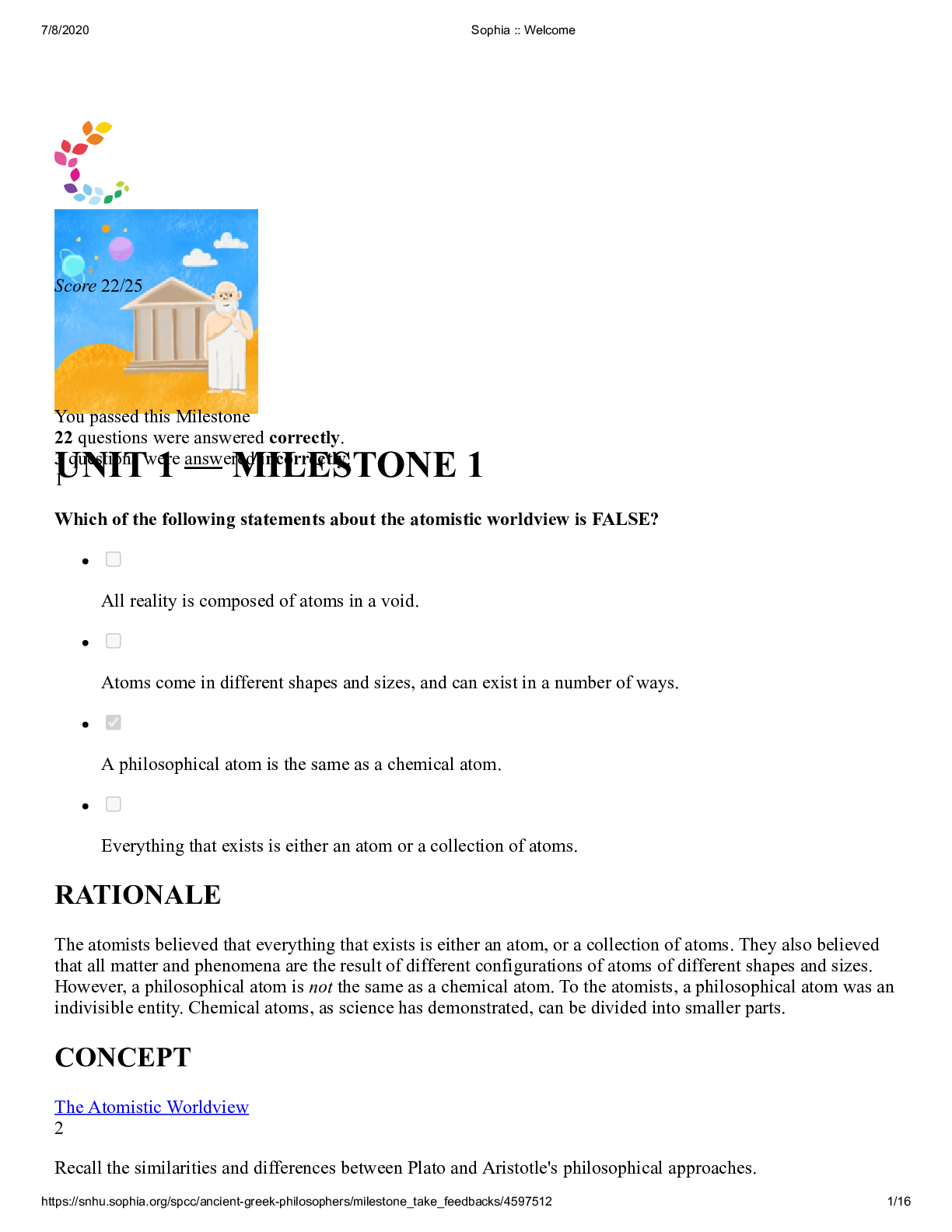
Reviews( 0 )
Document information
Connected school, study & course
About the document
Uploaded On
Sep 07, 2020
Number of pages
16
Written in
Additional information
This document has been written for:
Uploaded
Sep 07, 2020
Downloads
0
Views
100


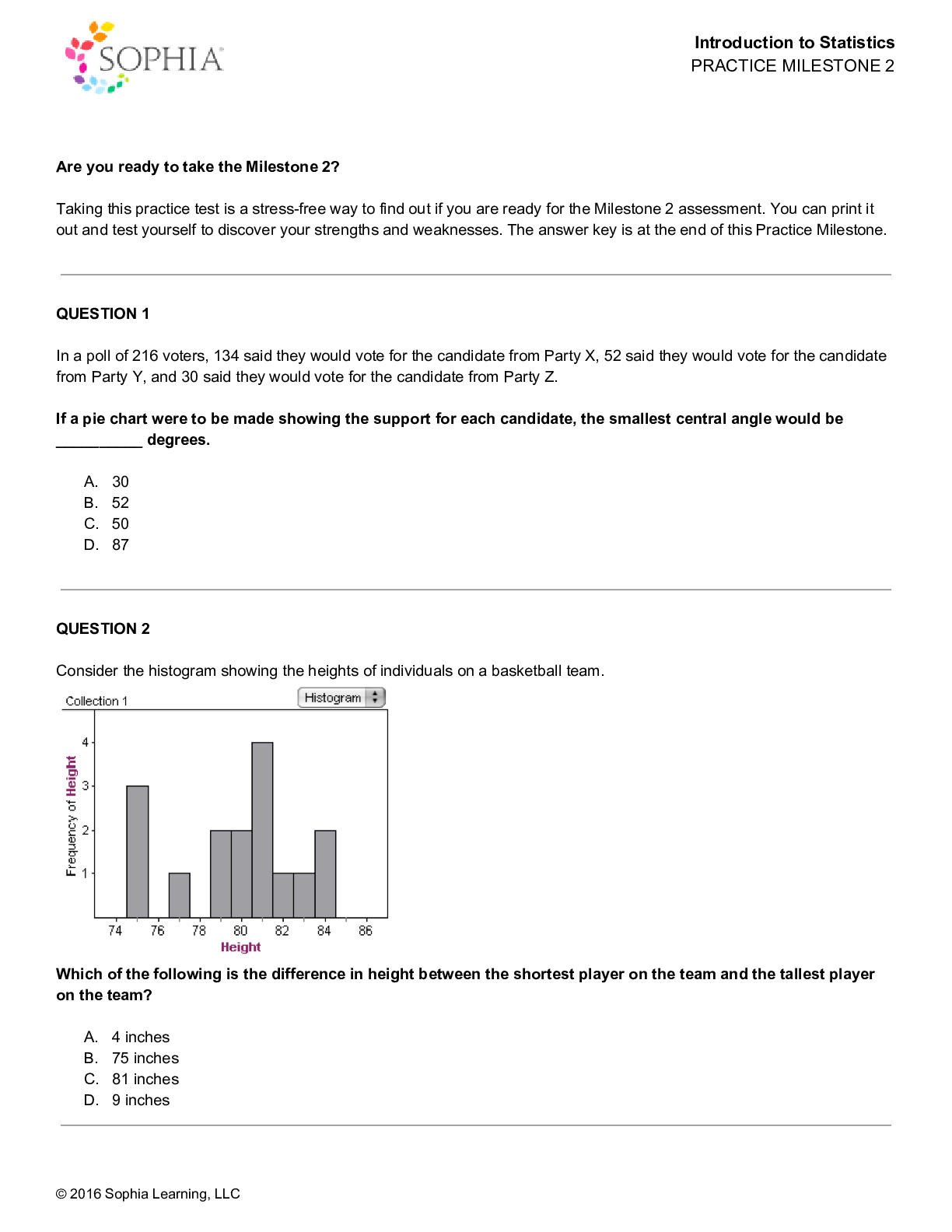
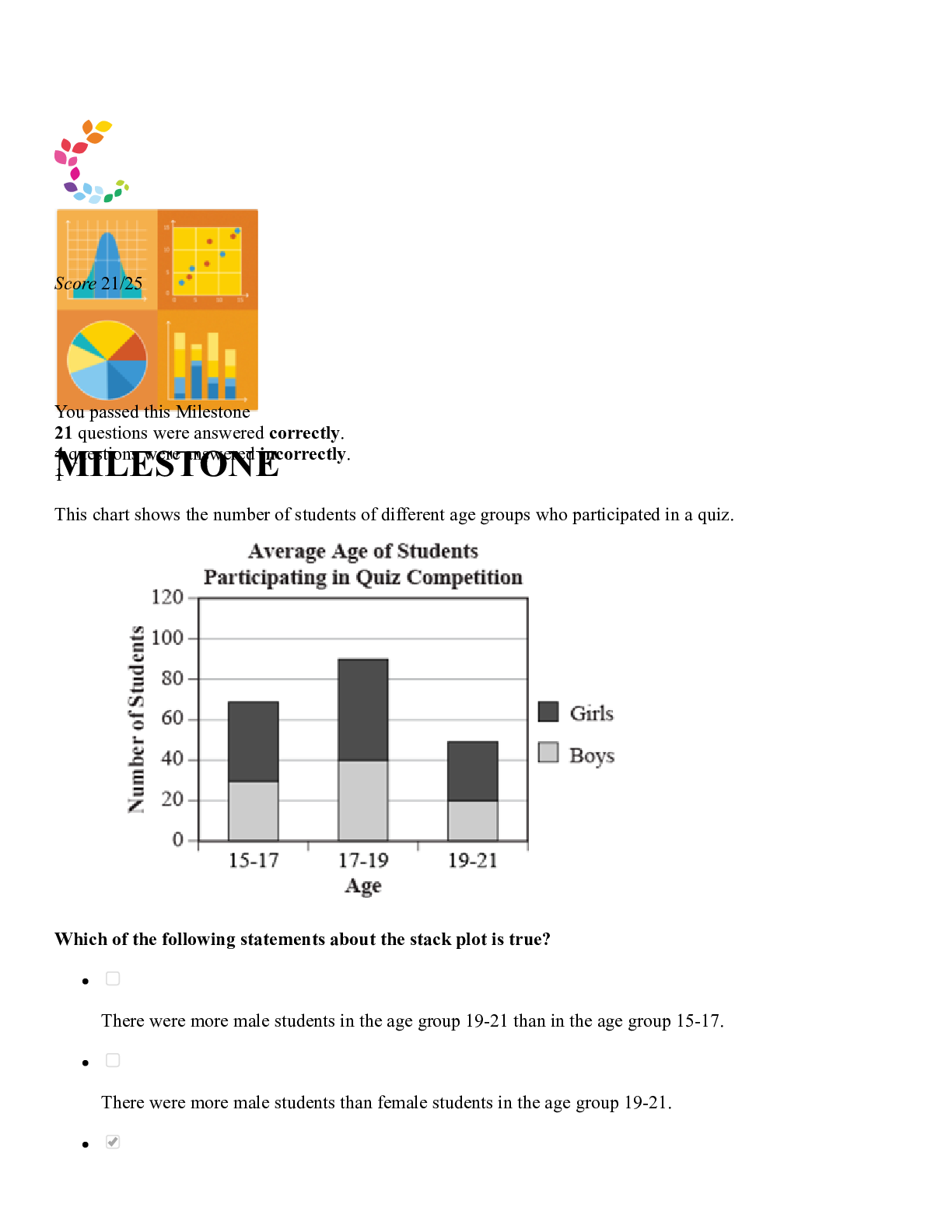


 – University of the People.png)

 – University of Maryland.png)
 – University of the People.png)
 – University of the People.png)
 – University of the People.png)
